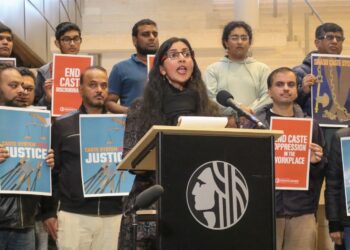The Minister of Public Safety in Canada has taken a firm stance against the promotion of violence, particularly in light of recent incidents involving pro-Khalistan supporters displaying posters glorifying the assassination of former Indian Prime Minister Indira Gandhi. This development has raised concerns and sparked debates about the boundaries of free speech and the implications of promoting violent ideologies.
“This week, there were reports of imagery depicting the assassination of Indian Prime Minister Indira Gandhi in Vancouver,” remarked Dominic A. LeBlanc, who serves as the Minister of Public Safety, Democratic Institutions, and Intergovernmental Affairs, on X.
LeBlanc stressed, “The promotion of violence is never acceptable in Canada.”
Indira Gandhi was assassinated by her Sikh bodyguards in 1984.
Meanwhile, Chandra Arya, an Indo-Canadian lawmaker representing the electoral district of Nepean in the House of Commons of Canada, expressed concern over Khalistan supporters in Vancouver displaying posters depicting the assassination of former Indian Prime Minister Indira Gandhi. Arya highlighted that these posters, featuring images of Gandhi with bullet holes and her Sikh bodyguards turned assassins, aim to instill fear among Hindu Canadians.
Arya, a member of Prime Minister Justin Trudeau’s party, noted that this incident follows similar threats, including a float in Brampton a couple of years ago and recent remarks by Gurpatwant Singh Pannun of Sikhs for Justice urging Hindus to return to India.
Pannun holds a prominent position within the Khalistan movement and serves as the legal advisor and spokesperson for Sikhs for Justice (SFJ), an organization advocating for the creation of a separate Sikh state. Arya urged Canadian law enforcement agencies to take swift action in response to the situation. He expressed concern that the use of imagery depicting firearms could escalate into real violence if not addressed promptly. Arya pointed out that the prominence of a bindi on Indira Gandhi’s forehead in the posters was a deliberate attempt to target Hindus in Canada.
For quite some time, India has consistently highlighted its primary concern with Canada, emphasizing the presence and support provided to “separatists, terrorists, and anti-India elements” within the country.
The Minister of Public Safety, whose identity has not been disclosed, has strongly condemned the actions of Khalistan supporters who displayed posters glorifying the assassination of former Indian Prime Minister Indira Gandhi. The posters, which appeared in several locations across Canada, have been met with widespread condemnation from various quarters.
The Minister emphasized that while Canada upholds the principles of free speech and expression, the promotion of violence and the glorification of terrorist acts are not acceptable. Such actions not only undermine the values of democracy and peaceful coexistence but also pose a threat to public safety and security.
The display of posters glorifying the assassination of Indira Gandhi by Khalistan supporters has reignited debates about the presence of extremist ideologies in Canada and the government’s role in addressing them. Critics argue that allowing the propagation of violent ideologies under the guise of free speech can have dangerous consequences and may fuel further radicalization.
The Minister’s statement comes amid growing concerns about the influence of extremist groups and individuals in Canada, particularly within the Sikh community. While the vast majority of Sikhs in Canada are peaceful and law-abiding citizens, there is a small but vocal minority that espouses separatist ideologies and promotes violence as a means to achieve their goals.
It is important to note that the Sikh community in Canada has a rich history and has made significant contributions to the country’s social, cultural, and economic fabric. The vast majority of Sikhs in Canada reject violence and extremism and are committed to upholding the values of peace, tolerance, and pluralism.











